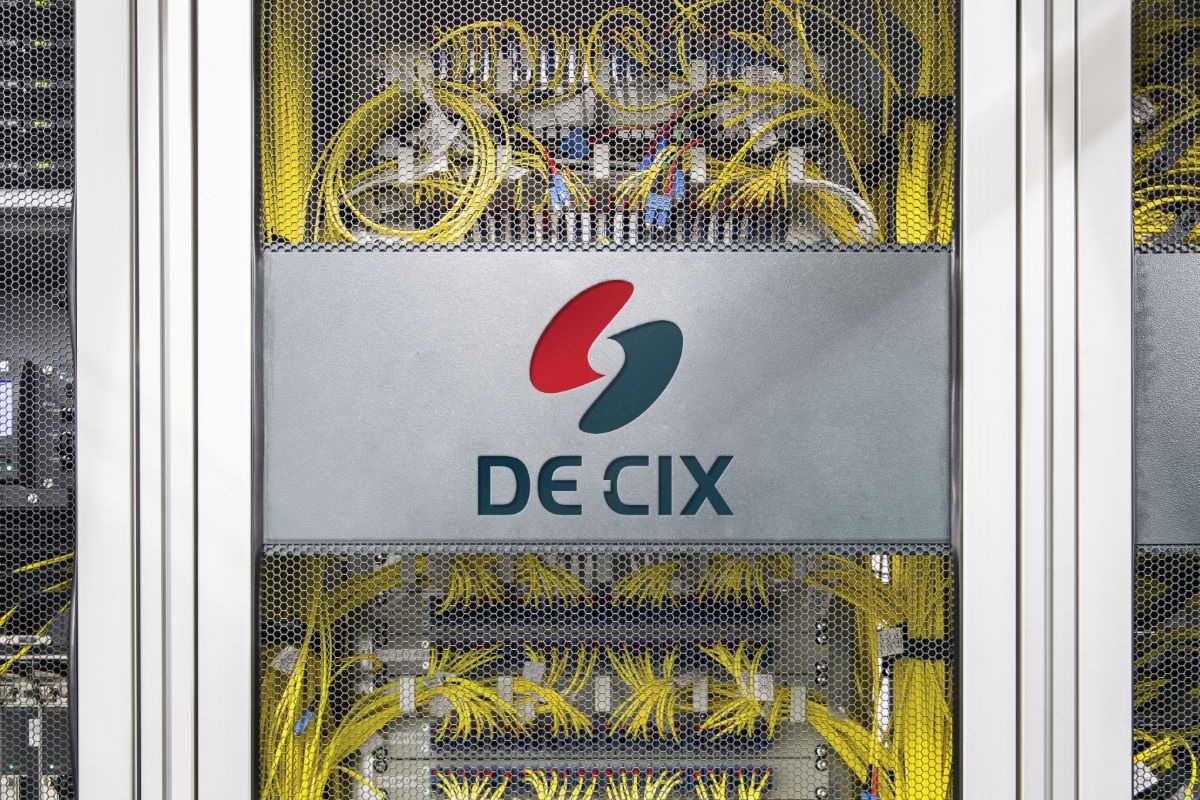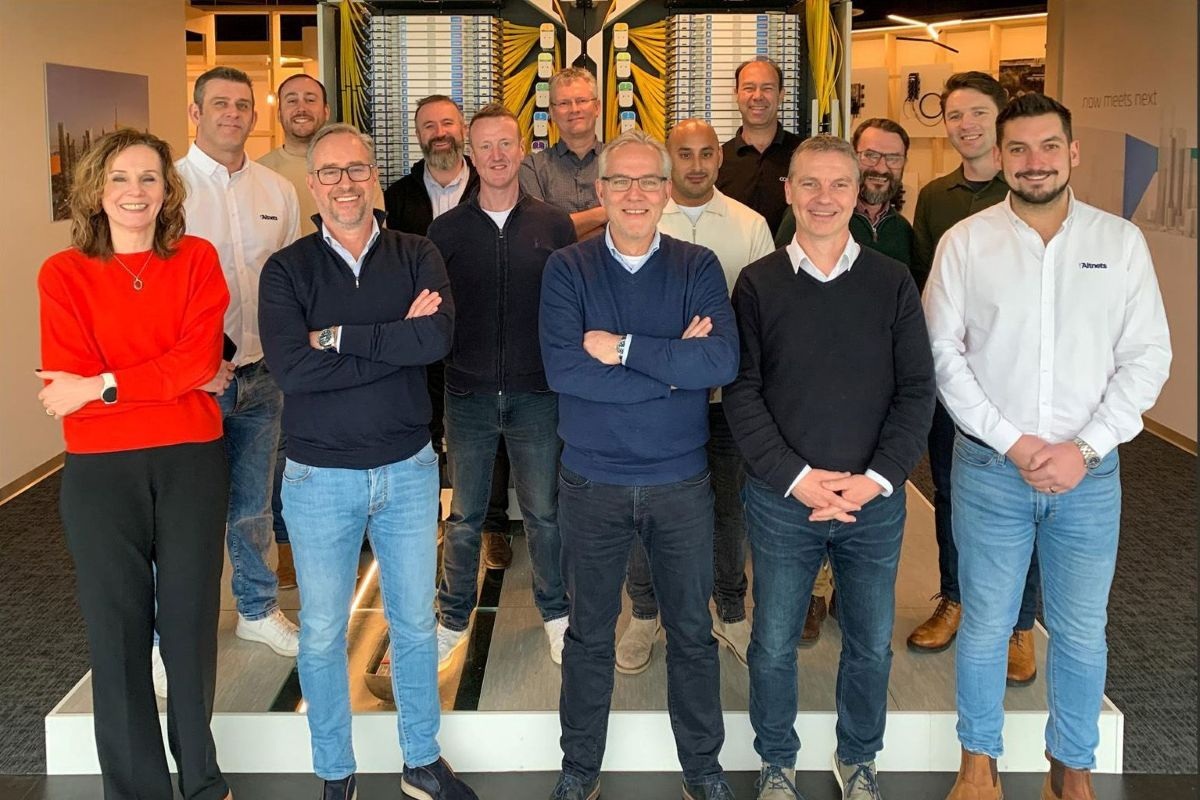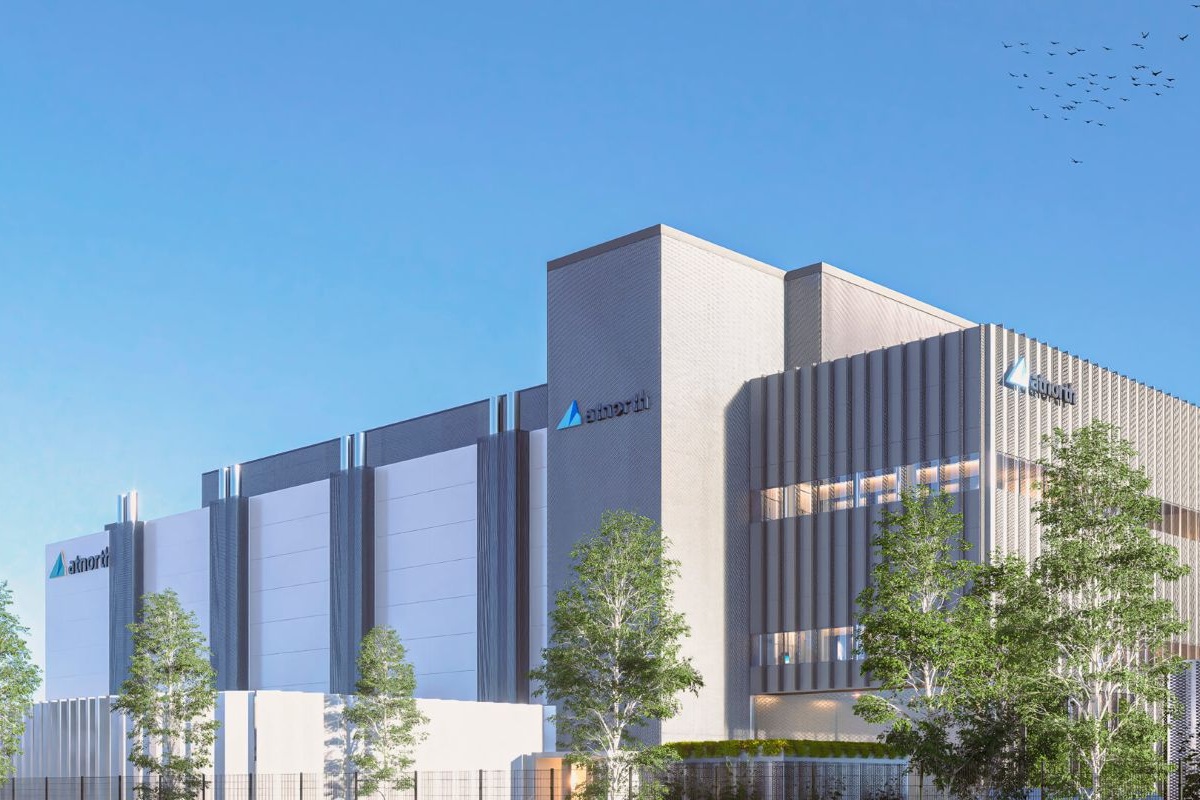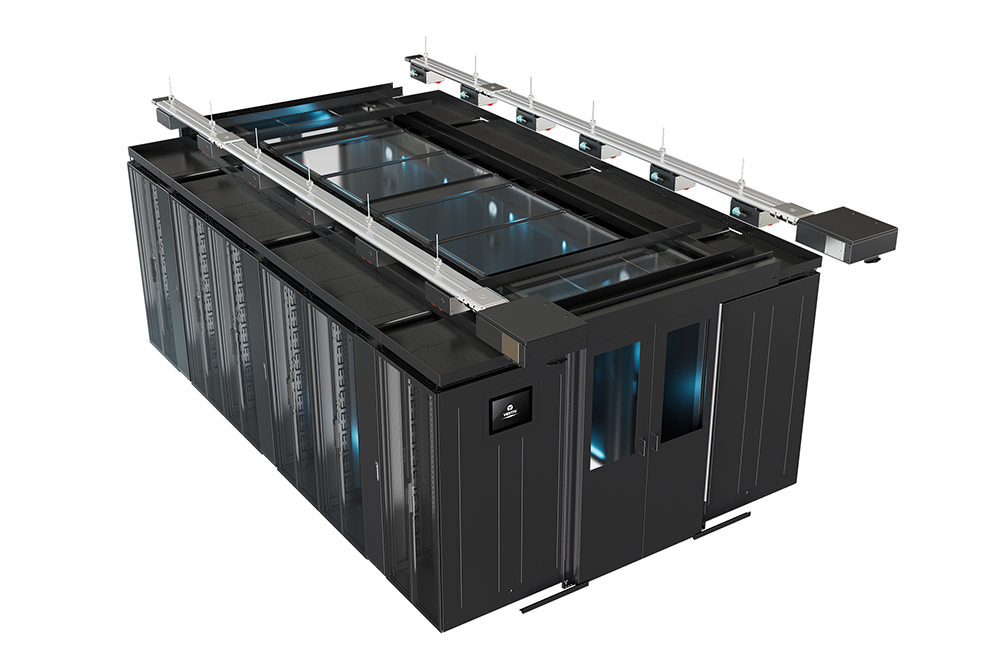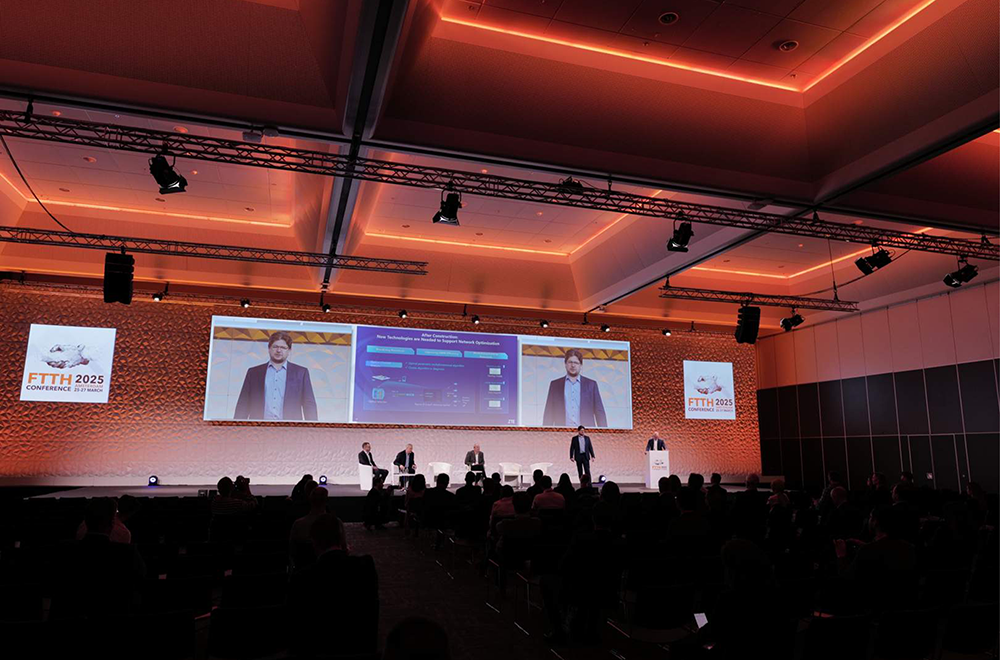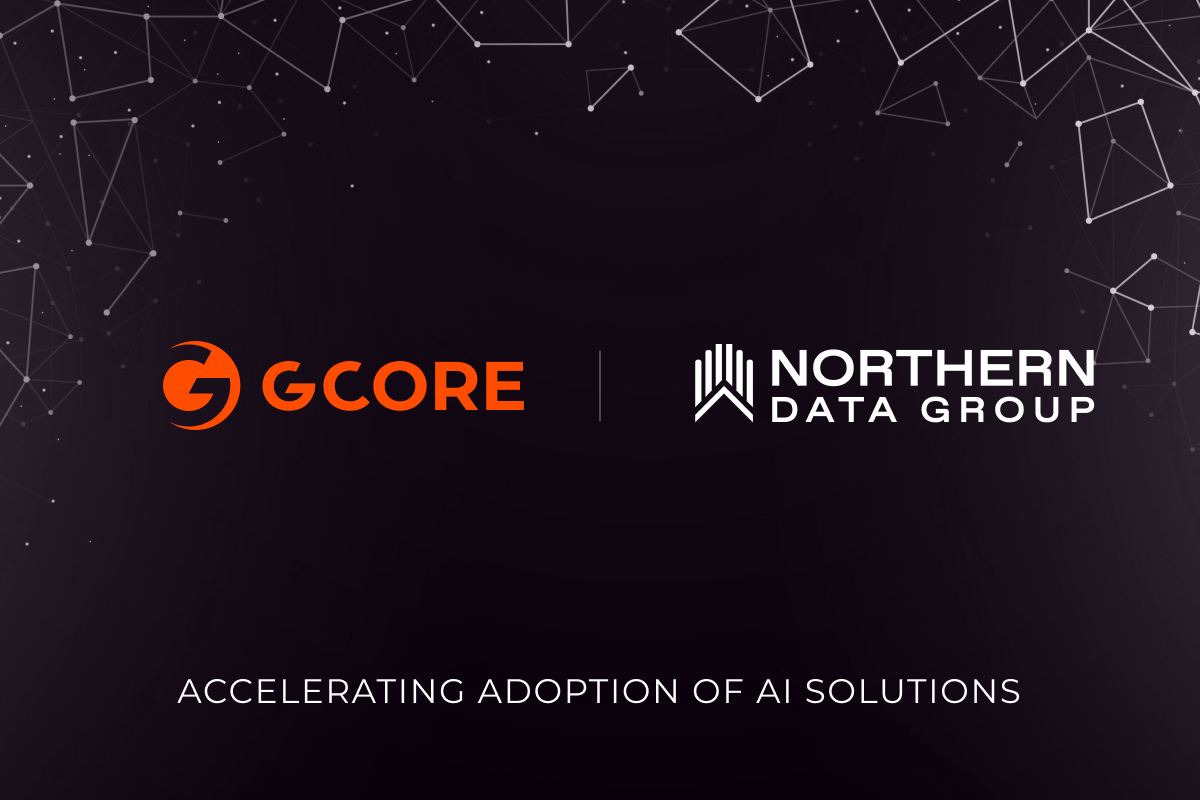Networking
Internet
Networking
News
DE-CIX reports 10% increase in global network connections
Internet Exchange (IX) operator, DE-CIX, has today released its results from the financial year 2024, demonstrating double-figure growth in networks, data traffic, and capacity.
The company finished the year with more than 4,000 networks connected worldwide, up 10% on the previous year, and 170 terabits connected customer capacity, which is a growth of 20%. Global peak traffic from peering – the direct interconnection of networks – finished the year just below 25 Tbit/s, up 11% from 2023. Global revenues grew by 8.3% to €68.6 million (£58.1m). Having added a further five IX locations during 2024, and announcing its market entry to Brazil, DE-CIX is today present in 60 markets on five continents.
The company operates several of the world’s most important IXs, including DE-CIX Frankfurt, the largest IX in Europe, DE-CIX New York, the largest in the Northeast of the US, DE-CIX Mumbai, the largest in India, and the UAE-IX powered by DE-CIX, the largest in the Middle East. With its connected networks and its geographical coverage, DE-CIX is unsurpassed worldwide in the provision of peering services via IXs – whether wholesale network peering, cloud peering, or application network peering.
Peering is used by network operators to optimise data pathways and enhance the performance and security of the digital content, services, and applications that make up the Internet. As well as catering to the long-standing wholesale network operator customer group, DE-CIX also provides enterprise-grade peering and interconnection services to global corporations and Fortune 500 companies. As such, the operator has a decisive influence on the global traffic flows that power the Internet, digital economies, and digital life.
Ivo Ivanov, CEO of DE-CIX, comments, “In our 30th anniversary year, the time has come for a new style of peering to meet the needs of the new Internet. Peering – direct network interconnection over an IX – will be central to creating AI-ready infrastructure for all future use-cases.
“Alongside Internet Exchanges creating network density in major aggregation points, AI Exchanges will be needed at the Deep Edge to support the development of multi-AI inference functionality in the next generation of products and services. Therefore, we will see a layered approach to infrastructure, integrating the hyper-local, the regional, the pan-regional, and the global. At DE-CIX, we are working towards the realisation of this vision to meet the needs of tomorrow – ready for the next 30 years of innovation and peering excellence.”
On 26 June 2025, DE-CIX will celebrate the 30th anniversary of its first Internet Exchange (IX) in Frankfurt, Germany – a milestone not only in the company’s history, but also in the development of the global Internet. Exactly 30 years to the day since its foundation, the celebration will take place in Frankfurt with the DE-CIX Global Interconnection Summit. Among the highlights will be the publication of a new study delving into existing and emerging Digital Capitals, of which Frankfurt is a leading example globally.
The full DE-CIX Annual Report 2024 can be downloaded by clicking here.
For more from DE-CIX, click here.
Simon Rowley - 6 May 2025
Data
Networking
News
CommScope and Altnets powering the fibre takeover
As part of the UK Government’s Project Gigabit, internet service providers (ISPs) are working to upgrade the nation’s data infrastructure. As one of the UK’s leading fibre suppliers, Brighton-based Altnets has already been at the forefront of bridging the UK’s digital divide. Altnets and CommScope will accelerate these fibre rollouts, improve network resilience, and support the next phase of digital connectivity. Additionally, supplying CommScope’s products paves the way for Altnets to support the rollout of FTTX networks and central offices, which will be of key importance for the future of the nation’s economic prosperity.
Paul Britnell, Co-Founder of Altnets, says, “We’re incredibly excited to support CommScope’s initiative to further support the UK telecoms sector, helping ISPs build faster and more resilient networks for the digital future. We are delivering high-density fibre connectivity solutions that are instrumental in FttX networks. Altnets is proud to play a key role in advancing the UK’s digital infrastructure."
CommScope's central office fibre optic and broadband solutions give network operators and ISPs access to the scalable, high-quality infrastructure needed to satisfy the increasing demand for ultra-fast broadband and connectivity in the UK. By harnessing Altnets' established market position and logistical expertise, these advanced connectivity solutions will be available throughout the UK.
Ronald Van der Kraan, VP Broadband – EMEA, comments, “We are pleased to be working with Altnets, who have vast industry expertise in full fibre products. We look forward to collaborating more to level up the UK’s digital infrastructure.”
As a fibre optic specialist, Altnets is in a unique position to efficiently supply CommScope's products to UK clients, guaranteeing that network operators, and ISPs have access to advanced fibre networks with GPON, XGS-PON, and high-density fibre solutions to meet rising bandwidth demands, alongside high-capacity 5G and wireless deployments for fronthaul, backhaul, and small cells.
Network operators must prioritise complete authority over their Optical Distribution Frames and fibre management systems and expand into high-processing Central Offices to accommodate the growing demand for data consumption. CommScope and Altnets ensure that the UK stays at the forefront of connectivity by providing innovative solutions that will drive the next phase of digital infrastructure.
For more from Altnets, click here.
Simon Rowley - 30 April 2025
Cloud
Networking
News
Telecoms
Nokia partners with atNorth to support cloud services in Finland
atNorth, a Nordic colocation, high-performance computing and AI service provider, has announced plans to support Nokia’s cloud infrastructure with a multi megawatt deployment at its FIN02 site in Finland (pictured above). The contract spans over 12 years and includes potential extensions totalling over 10MW.
Nokia, one of the world’s leading telecommunications and networking technology companies, is headquartered in Finland and has long utilised Finnish data centres, leveraging the country’s cool climate and renewable energy sources to ensure the sustainability of its workloads. In fact, the business was ranked as the most sustainable telecoms and communications company in the world earlier this year.
Nokia and atNorth have built a long-standing relationship through atNorth’s use of Nokia data centre switches that power its HPCaaS offering, which currently runs from its data centres in Iceland and Sweden.
Well versed in the evolving data centre landscape, Nokia was looking for a data centre partner that could accommodate its high-density infrastructure needs without compromising its environmental credentials. The business required capacity suitable for high-density workloads of more than 130kw per rack, available at speed and with the potential for future scalability.
Located in Espoo, Greater Helsinki, atNorth’s newest data centre, FIN02, runs on renewable energy and features robust power and liquid cooling capabilities. Built for scalability, its modular design supports high-performance workloads. A collaboration with Kesko Corporation enables waste heat recycling to heat a nearby store, further lowering its carbon footprint.
“atNorth was able to meet our complex technical requirements at speed without compromising on our sustainability goals,” says Marika Mentula, Vice President for Network Infrastructure North Europe at Nokia. “By helping support our cloud infrastructure at atNorth’s FIN02 data center, we can deliver high-performance infrastructure that supports our most demanding applications.”
Eyjólfur Magnús Kristinsson, CEO of atNorth, adds, “As the data centre industry continues to grow at record speed, it’s clear that businesses are increasingly seeking the full package - sustainable, secure, infrastructure that can scale rapidly. Our longstanding partnership with Nokia, rooted in the hardware demands of our HPCaaS offering and built on a shared commitment to sustainability, is a testament to that. It adds to a growing list of globally recognized companies that trust atNorth with their mission-critical data and rely on us to deliver best-in-class service.”
The news follows atNorth’s recent announcement of its heat reuse partnership with retail giant, Kesko Corporation at its FIN02 data centre in Finland. The business has two other metro sites near Helsinki, and a fourth ‘mega’ site - which is currently in development in Kouvola - is expected to be operational by the end of 2025.
For more from atNorth, click here.
Simon Rowley - 29 April 2025
Data
Networking
News
Security
Cyber attacks drop by nearly 10%
Four in 10 (43%) of UK businesses and 30% of charities experienced cyber attacks or data breaches in the last 12 months, according to the latest Cyber Security Breaches Survey. While this marks a slight decrease from last year’s 50%, the threat level for medium and large businesses remains alarmingly high.
The average cost of the most disruptive breach was estimated at £1,600 for businesses and £3,240 for charities.
The drop in incidents is attributed mainly to fewer small businesses reporting breaches – but government officials warn against complacency. With cyber threats increasingly targeting critical infrastructure, the UK Government is introducing the Cyber Security and Resilience Bill, compelling organisations to strengthen their digital defences.
The survey found that 70% of large businesses now have a formal cyber strategy in place, compared to just 57% of medium-sized firms – exposing a potential gap in preparedness among mid-sized enterprises.
There has been a notable improvement in cyber hygiene practices among smaller businesses, with rising adoption of risk assessments, cyber insurance, formal cyber security policies and continuity planning.
These steps are seen as essential in building digital resilience across the UK economy.
However, the number of high-income charities implementing best practices such as risk assessments has declined. Insights suggest this may be linked to budgetary pressures, limiting their ability to invest in adequate cyber security measures.
Sawan Joshi, Group Director of Information Security at FDM Group, comments, “Keeping banking systems online is becoming more challenging, and technology alone isn’t enough. Skilled IT teams are crucial for spotting risks early and responding quickly to prevent disruptions. Organisations need to invest in ongoing training so their staff can strengthen system defences and recover fast when issues arise. A mix of advanced monitoring, backup systems, and a well-trained workforce is key to keeping services running and maintaining customer trust.'"
The Government has also confirmed that UK data centres are now officially designated as critical national infrastructure. This means they will receive the same priority in the event of a major incident - such as a cyber attack - as essential services like water and energy.
Carly Weller - 11 April 2025
Artificial Intelligence
Cloud Computing & Storage
Data
Networking
Juniper and Google Cloud enhance branch deployments
Juniper Networks has announced its collaboration with Google Cloud to accelerate new enterprise campus and branch deployments and optimise user experiences. With just a few clicks in the Google Cloud Marketplace, customers can subscribe to Google’s Cloud WAN solution alongside Juniper Mist wired, wireless, NAC, firewalls and secure SD-WAN solutions.
Unveiled at Google Cloud Next 25, the solution is designed to simply, securely and reliably connect users to critical applications and AI workloads whether on the internet, across clouds or within data centres.
“At Google Cloud, we’re committed to providing our customers with the most advanced and innovative networking solutions. Our expanded collaboration with Juniper Networks and the integration of its AI-native networking capabilities with Google’s Cloud WAN represent a significant step forward,” says Muninder Singh Sambi, VP/GM, Networking, Google Cloud. “By combining the power of Google Cloud’s global infrastructure with Juniper’s expertise in AI for networking, we’re empowering enterprises to build more agile, secure and automated networks that can meet the demands of today’s dynamic business environment.”
AIOps key to GenAI application growth
As the cloud expands and GenAI applications grow, reliable connectivity, enhanced application performance and low latency are paramount. Businesses are turning to cloud-based network services to meet these demands. However, many face challenges with operational complexity, high costs, security gaps and inconsistent application performance. Assuring the best user experience through AI-native operations (AIOps) is essential to overcoming these challenges and maximising efficiency.
Powered by Juniper’s Mist AI-Native Networking platform, Google’s Cloud WAN, a new solution from Google Cloud, delivers a fully managed, reliable and secure enterprise backbone for branch transformation. Mist is purpose-built to leverage AIOps for optimised campus and branch experiences, assuring that connections are reliable, measurable and secure for every device, user, application and asset.
“Mist has become synonymous with AI and cloud-native operations that optimise user experiences while minimising operator costs,” says Sujai Hajela, EVP, Campus and Branch, Juniper Networks. “Juniper’s AI-Native Networking Platform is a perfect complement to Google’s Cloud WAN solution, enabling enterprises to overcome campus and branch management complexity and optimise application performance through low latency connectivity, self-driving automation and proactive insights.”
Google’s Cloud WAN delivers high-performance connections for campus and branch
The campus and branch services on Google’s Cloud WAN driven by Mist provide a single, secure and high-performance connection point for all branch traffic. A variety of wired, wireless, NAC and WAN services can be hosted on Google Cloud Platform, enabling businesses to eliminate on-premises hardware, dramatically simplifying branch operations and reducing operational costs. By natively integrating Juniper and other strategic partners with Google Cloud, Google’s Cloud WAN solution enhances agility, enabling rapid deployment of new branches and services, while improving security through consistent policies and cloud-delivered threat protection.
Carly Weller - 11 April 2025
Edge
Networking
News
Vertiv upgrades SmartAisle for efficient edge computing in EMEA
Vertiv has announced a significant upgrade to its Vertiv SmartAisle solution, designed specifically for edge computing applications up to 180kW.
Now available across Europe, the Middle East and Africa (EMEA), this complete pre-engineered system combines power, cooling, racks and advanced management and monitoring capabilities in a single integrated unit, designed to simplify and quicken edge computing deployments. In line with the European Union Energy Efficiency Directive (EED) the system provides energy efficient operation and includes power usage effectiveness (PUE) monitoring to help organisations track operations alongside their responsible business goals.
"The upgraded Vertiv SmartAisle really changes the game when it comes to effective and successful edge deployments", says Giuseppe Leto, Senior Director IT Systems Business at Vertiv in EMEA. "We've made it easier, faster and more cost-effective for businesses to scale and grow their IT operations. The pre-engineered system eliminates the traditional challenges of planning of multiple equipment installations and logistics while providing customers with a complete, reliable end-to-end solution that allows data centre operators to monitor energy efficiency requirements following the latest EU regulations.”
The embedded Vertiv RDU501 intelligent infrastructure management appliance allows data centre operators to control system operations in real-time 24/7, offering a consolidated and easy to use monitoring and management platform. In addition, the Vertiv approach to pre-engineered, edge smart solutions helps organisations reduce planning, design and site preparation time by up to 80% while lowering deployment costs by up to 30% compared to a brick-and-mortar alternative, while the integration of all components is designed to achieve up to 20% higher energy efficiency compared to industry averages.
Vertiv SmartAisle is part of Vertiv’s growing portfolio of flexible, fully pre-engineered modular solutions. The system is available as standard in four different reference designs, with the ability to scale up to 180kW IT load and features N+1 redundancy for both power and cooling systems.
Key features and benefits include:
· Advanced 24/7 monitoring of energy consumption and capacity management
· Precise environmental monitoring with six sensors per server rack
· High efficiency, modular uninterruptible power supply (UPS) systems
· Power distribution through power bars or floor-mounted PDUs
· Integrated power monitoring via rack-mounted power distribution units (rPDU)
· Adaptive direct expansion cooling system with 20-100% modulating capacity
· Enhanced thermal efficiency through cold aisle containment
· Advanced physical security with e-handles and IP cameras
· Scalable architecture enabling standardised deployment across multiple edge sites
Carly Weller - 10 April 2025
Data
Networking
ZTE enhances all-optical networks with smart ODN solutions
Hans Neff, Senior Director of ZTE CTO Group, recently delivered a keynote speech entitled ‘Embracing the AI Era to Accelerate the Development of All-Optical Networks’ at the FTTH Conference 2025 in Amsterdam, sharing the company's solutions and experience in focusing on AI empowerment to achieve intelligent ODN, improve the deployment efficiency of all-optical networks, and reduce deployment and O&M costs.
At present, the deployment of all-optical networks is continuously accelerated, and the rapidly developing AI is increasingly integrated into broadband IT systems, significantly improving the intelligent level of FTTx deployment, operation and maintenance. In Europe, the National Broadband Plan (NBP) and the EU policies are actively advocating for an all-optical, gigabit and digitally intelligent society, and the demand for sustainable, efficient and future-oriented network infrastructure is growing.
Hans pointed out that operators are facing challenges such as high costs, complex network management and diverse deployment scenarios. AI and digital intelligence can provide end-to-end support for ODN construction in multiple aspects. Hans described how ZTE leverages AI technology to build intelligent ODNs across the entire process, enhancing efficiency and reducing operational complexity.
He elaborated on the specific applications and advantages of intelligent ODN across three phases: before, during and after deployment. Before deployment, one-click zero-touch site surveys, AI-based automatic planning and design, and paperless processes replace traditional manual methods, significantly reducing the time and human resources required. During deployment, real-time visualised and cost-effective solutions, along with tailored product combinations - such as pre-connectorised splice-free ODN, plug-and-play deployment and air-blowing solutions - ensure smooth construction while reducing both time and labour costs.
After deployment and delivery, intelligent real-time ODN network detection, analysis and risk warnings minimise fault location time, improving monitoring accuracy and troubleshooting efficiency. Additionally, new solutions like passive ID branch detection enable 24/7 real-time optical link monitoring, dynamic perception of link changes and automatic updates, ensuring 100% accuracy of end-to-end ODN resources. This proactive approach optimises network performance while streamlining maintenance and resource management.
Hans emphasised that collaboration among multiple parties is key to accelerating the construction of intelligent ODN networks. Suppliers play a vital role in driving digital and intelligent platforms, developing innovative product portfolios and delivering localised solutions through strategic partnerships. By leveraging AI and digital intelligence, operators and stakeholders can effectively address challenges such as high costs, complex construction and maintenance, and regional adaptability.
ZTE says it is committed to providing comprehensive intelligent ODN solutions and building end-to-end all-optical networks. Moving forward, ZTE will continue collaborating with global partners to harness its advanced network and intelligent capabilities. ZTE aims to help operators build and operate cutting-edge, efficient and intelligent broadband networks, unlocking new application scenarios and fostering a ubiquitous, green and efficient era of all-optical networks.
Carly Weller - 9 April 2025
Artificial Intelligence
Cloud
Data Centres
Raxio lands $100m to expand sub-Saharan African data centres
Raxio Group has signed an agreement for $100 million in financing from the International Finance Corporation (IFC) to accelerate Raxio’s expansion of data centres to power key technologies like AI, cloud computing and digital financial services – critical enablers of African economic growth and digital inclusion.
The debt funding from IFC will help Raxio double its deployment of high-quality colocation data centres within three years, addressing growing demand in underserved markets across the continent. The company is developing a Sub-Saharan African regional data centre platform in countries including Ethiopia, Mozambique, the Democratic Republic of Congo, Côte d’Ivoire, Tanzania and Angola.
Raxio is committed to bridging Africa’s digital divide by introducing Tier III-certified, carrier-neutral, and secure data services to markets that have been overlooked by other providers. With a focus on high-growth areas, the company is tapping into regions with significant economic potential to unlock new opportunities across the continent.
“Raxio’s business model shows how digital infrastructure can empower businesses, governments and communities to thrive in the digital economy,” says Sarvesh Suri, IFC Regional Industry Director, Infrastructure and Natural Resources in Africa. “This partnership between Raxio and IFC is set to strengthen Africa’s digital ecosystem and catalyse further investments and regional integration, building a more inclusive and sustainable future.”
“This funding from IFC is a powerful endorsement of Raxio’s vision and operational excellence,” says Robert Skjødt, CEO of Raxio Group. “It will allow us to bring critical infrastructure to the regions that need it most and attract further investment as we continue to grow. Together with our other partners, we’re building the foundation for Africa’s digital future and setting new benchmarks for sustainability.”
Raxio’s facilities are designed for 24/7 reliability, ensuring uninterrupted service even during maintenance or unforeseen disruptions. The company integrates renewable energy solutions to minimise its environmental footprint and uses innovative energy-efficient equipment to reduce electricity and water consumption for cooling in several of its countries of operation.
In the Democratic Republic of Congo, Raxio’s Kinshasa facility is poised to meet growing demand for data services in one of Africa’s largest and fastest-growing urban centres. In Côte d’Ivoire, Raxio is establishing a digital hub to serve Francophone West Africa, connecting regional markets and facilitating cross-border trade. These efforts are empowering local businesses and integrating them into the global digital economy.
Carly Weller - 7 April 2025
Networking
News
Security
AlgoSec publishes State of Network Security Report
Global cyber security expert, AlgoSec, has released its annual The State of Network Security Report. The report provides a comprehensive and objective, vendor-agnostic analysis of today’s network security landscape by identifying key market trends, highlighting in-demand solutions and technologies, and detailing the most popular strategies being adopted by security professionals.
The report identifies significant shifts in cloud platform adoption, deployment of firewalls and Software-Defined Wide Area Networks (SD-WAN), as well as Secure Access Service Edge (SASE) implementation and AI. Based on comparative findings from 2024 and 2025, AlgoSec’s research includes responses from security, network and cloud professionals across 28 countries and evaluates market leaders including Cisco, Microsoft Azure, AWS, Check Point, Palo Alto Networks and more.
Key findings from the report include:
• Security visibility gaps are driving a shift in security management - 71% of security teams struggle with visibility, which is delaying threat detection and response. The lack of insight into application connectivity, security policies and dependencies are proving to be a significant risk.• Multi-cloud and cloud firewalls are now standard – Businesses continue to adopt multi-cloud environments, with Azure becoming the most widely used platform in 2025.• Firewall and SD-WAN adoption grow despite complexity – Multi-vendor strategies make firewall deployment more challenging. In terms of customer base, Palo Alto Networks took the lead, but Fortinet’s NGFW is gaining traction. SD-WAN adoption jumped, with Fortinet rising from 19.1% in 2024 to 25.8% in 2025.• Zero-trust and SASE gain momentum – Zero-trust awareness is at an all-time high, with 56% of businesses fully or partially implementing it; though 20% are still in the learning phase. SASE adoption is also growing, with Zscaler leading at 35%, while Netskope has gained 15% market share.• AI and automation are reshaping security – AI-driven security tools are improving real-time threat detection, but implementation and privacy concerns remain a challenge. Automation is now critical, with application connectivity automation ranked as the top priority for minimising risk and downtime.
“As businesses expand their digital footprints across hybrid and multi-cloud environments, securing network infrastructure has become a top challenge,” says Eran Shiff, VP of Product at AlgoSec. “We are seeing a major shift toward automation, orchestration and risk mitigation as key security priorities. Adoption of SD-WAN and SASE continues to rise, while awareness of AI-driven security and zero-trust principles is stronger than ever.”
The full report can be accessed by clicking here.
For more from AlgoSec, click here.
Simon Rowley - 3 April 2025
Networking
News
Northern Data Group and Gcore announce strategic partnership
Northern Data has announced that it has signed a commercial partnership agreement with Gcore, a global edge AI, cloud, network, and security technologies provider to large enterprise clients. The commercial partnership will provide combined AI as a Service and AI delivery and networking technologies to enterprise clients and model developers.
Furthermore, the partnership establishes the Intelligence Delivery Network (IDN), a distributed global network that boasts 180 points of presence, more than 200 Tbps of network capacity, and over 14,000 peering partners; combined with Northern Data’s position as one of Europe’s largest GPU infrastructure providers. The IDN is designed to enable the low-latency and secure delivery of AI workloads at the edge, a critical driver for the wider adoption of AI inferencing applications. The AI inferencing market is expected to grow to $169 billion by 2032, according to Bloomberg Intelligence.
The IDN will be powered by Northern Data’s existing infrastructure and Gcore’s Everywhere Inference software and networking architecture. Through the combined infrastructure and software stack, customers will be enabled by a powerful vertically integrated toolkit of AI innovations, including Managed Kubernetes and an AI model library. The technology supports the deployment of both open source and custom-built AI models.
Northern Data and Gcore’s combined offering will be delivered with just a few clicks through an on-demand and simple-to-deploy architecture, offering clients real-time access to this full-stack solution and allowing Northern Data and Gcore to fully maximise the utilisation of its infrastructure. Additionally, the partnership will seek to deploy AI solutions globally, retain enterprise grade security and data protection and sovereignty, and optimise infrastructure resourcing.
Aroosh Thillainathan, Founder and CEO, Northern Data Group, comments, “We are combining Northern Data’s heritage of HPC and data centre infrastructure expertise with Gcore’s software innovation and engineering expertise, allowing us to accelerate our vision of delivering software-enabled AI infrastructure across a globally distributed compute network. This is an inflection point where the use of AI solutions is evolving rapidly, and we believe that this partnership will form a key part of the next phase of AI adoption.”
Andre Reitenbach, CEO, Gcore, adds, Partnering with Northern Data will provide Gcore and our enterprise customers access to one of the largest liquid-cooled GPU clusters and significant data centre capacity worldwide. This collaboration supports Gcore’s mission to connect the world to AI anywhere and anytime with low latency, leveraging cutting-edge infrastructure to power the next generation of AI-driven applications.”
For more from Gcore, click here.
Simon Rowley - 3 April 2025

Head office & Accounts:
Suite 14, 6-8 Revenge Road, Lordswood
Kent ME5 8UD
T: +44 (0)1634 673163
F: +44 (0)1634 673173
